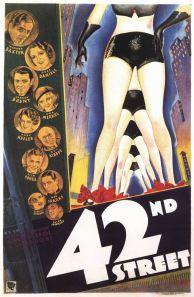 When word gets out that producers Jones and Barry are putting on a new show, it’s the talk of the theater world. Since the nation is in the midst of the Great Depression, a lot of people are depending on this show; everyone from electricians and set builders to chorus girls and the show’s director need it to be a hit. Julian Marsh (Warner Baxter) agrees to direct the show despite his doctor’s advice. Julian has recently suffered a nervous breakdown and was advised to find a less stressful profession. But Julian can’t afford to retire, so he needs it to be a hit so he can afford to get out of the business.
When word gets out that producers Jones and Barry are putting on a new show, it’s the talk of the theater world. Since the nation is in the midst of the Great Depression, a lot of people are depending on this show; everyone from electricians and set builders to chorus girls and the show’s director need it to be a hit. Julian Marsh (Warner Baxter) agrees to direct the show despite his doctor’s advice. Julian has recently suffered a nervous breakdown and was advised to find a less stressful profession. But Julian can’t afford to retire, so he needs it to be a hit so he can afford to get out of the business.
One person who is living comfortably, despite the Depression, is Dorothy Brock (Bebe Daniels). She’s the girlfriend of Abner Dillon (Guy Kibbee), the show’s financial backer, which means she has no problem securing a position as the show’s leading lady. Other ladies clamor for the chance to be in the chorus, including Peggy Sawyer (Ruby Keeler), who is new to the theater world. But Peggy has no problem fitting in and quickly makes friends with fellow chorines Annie (Ginger Rogers) and Lorraine (Una Merkel) and catches the eye of Billy Lawler (Dick Powell).
After rehearsals get underway, the producers find out that Dorothy has been seeing her former vaudeville partner Pat Denning (George Brent) on the side. Not wanting to endanger the show, they try to put a stop to it. But just before the show is set to open, Abner finds out about Dorothy’s two-timing, they get into a fight, and he wants her out of the show. The producers protest, but when Dorothy injures her ankle, they have no choice but to re-cast the lead. Abner wants Annie to take the lead, but she knows she isn’t up to the task. However, she believes Peggy is.
When 42nd Street was released in 1933, the concept of the backstage musical had already been done before in movies like The Broadway Melody. But when 42nd Street came along, it not only became the ultimate backstage musical, it revolutionized the entire genre of musicals. Everyone wanted to mimic Busby Berkley’s style of choreography. But unlike many early musicals, 42nd Street can hardly be described as creaky or dull. Its slick production values, catchy songs, memorable choreography, and witty banter keep it fresh even after eighty years.
